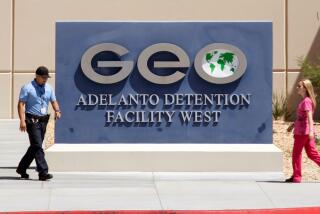Judge restores immigrant-detention hotline featured in ‘Orange Is the New Black’
A federal judge on Tuesday demanded that U.S. Immigration and Customs Enforcement temporarily restore a national toll-free hotline for detained immigrants that was shut down two weeks after being featured on the television show “Orange Is the New Black.”
Freedom for Immigrants, which ran the confidential hotline, sued the Department of Homeland Security in January, contending that the termination was an act of retaliation and a violation of free speech. The California-based group advocates for an end to immigrant detention and has long been a vocal critic of ICE, which is overseen by DHS.
Under the court order, ICE must bring back the telephone extension while the legal case continues. The court also concluded that Freedom for Immigrants is likely to win.
“For too long, ICE has censored our speech and invented imaginary rules to terminate our programs,” said Freedom for Immigrants executive director Christina Fialho. “This case should remind us all that the Trump administration is not a law unto itself but rather accountable to the people and our Constitution.”
In a statement, ICE said it can’t comment on pending litigation. In court documents, lawyers for ICE maintained that the agency has the right to regulate phone access by detainees.
“At its core, this case is about an unapproved nonprofit organization that took over and continued to use a free and unmonitored pro bono extension number to facilitate calls with immigrant detainees,” they wrote.
During a hearing in Los Angeles last month, U.S. District Judge André Birotte Jr. laid out a timeline of events that could be perceived as retaliation by ICE.
In July 2013, Freedom for Immigrants published a column in the Huffington Post critical of ICE and the treatment of detainees in Orange County. Two days later, ICE shut down its visitation programs at three Los Angeles-area facilities.
That same summer, an affiliated organization warned ICE about alleged abuse at the Otay Mesa Detention Center in San Diego. ICE shut down the organization’s visitation program at Otay Mesa in August 2013.
In July 2015, Freedom for Immigrants filed a complaint with the DHS Office for Civil Rights and Civil Liberties on behalf of immigrants detained at the Etowah County Detention Center in Alabama. Two weeks later, ICE and the local sheriff’s department terminated the organization’s visitation program at Etowah.
In November 2017, the organization helped women at the West County Detention Facility in Northern California publish a letter complaining of inhumane treatment. Four months later, its visitation program was shut down.
In each of these instances and in others, the visitation programs were later reinstated by ICE. But Birotte said the timing was cause for concern.
“Is it just a coincidence that these things would happen in some instances 48 hours after criticism?” he asked Anna Dichter, an attorney representing ICE.
Freedom for Immigrants had held a toll-free immigrant detention hotline since 2013, when it helped an affiliated organization — Friends of Miami-Dade Detainees — start a visitation program in Florida. Some months, volunteers who staffed the phone lines received more than 10,000 calls from detainees around the country, many of them held in rural facilities and with no money to call friends or family. They connect immigrants to lawyers, help them gather necessary documents for their case, and assist them in filing complaints about rights violations and abuse.
Toll-free numbers for pro bono attorneys and organizations are approved by the Executive Office for Immigration Review, which oversees the immigration courts. The numbers are extensions issued by the phone service provider, Talton Communications, because 1-800 numbers don’t work from within detention facilities. Detainees must pay for calls to all other numbers. Unlike criminal inmates, immigrant detainees are not entitled to free legal counsel or a free phone call.
In November 2018, ICE restricted the Freedom for Immigrants hotline to seven detention facilities in Florida. In an email afterward, an ICE employee explained that the agency had recently completed an audit for the pro bono system to ensure that each facility was being served by local organizations.
Dichter said during the court hearing that Freedom for Immigrants wasn’t listed on the original request for the hotline and that there never was any indication the goal was to reach detainees beyond Florida.
“The whole point of this system is to be based on locality,” she said. Freedom for Immigrants “benefited off a glitch in the system, which DHS corrected.”
But letters and emails submitted as part of the lawsuit also make it clear that ICE knew the two organizations were linked. The first letter, dated Aug. 5, 2013, requested ICE’s approval for the visitation program at a Miami-area detention facility and the establishment of a hotline. It was signed by Fialho, the director of Freedom for Immigrants, and local advocates.
Then the hotline was featured as part of the immigrant detention plot during the seventh season of the Netflix series “Orange Is the New Black,” which was released July 26.
On Aug. 7, ICE shut it down.
At the time, ICE had argued that organizations found in violation of rules against three-way calling and call forwarding would be removed from the pro bono platform. But evidence submitted to the court suggested that officials were aware of call forwarding as early as December 2013.
Dichter said EOIR had amended regulations in 2015 to clarify what types of organizations could be on the list. Then last summer, ICE standardized its application process. Now hotlines must be re-approved every three years and those no longer appearing on the EOIR list are removed from the system. Because Freedom for Immigrants isn’t a legal service provider itself, she said, the organization doesn’t qualify to remain on the list.
Birotte, the judge, asked Dichter for a written memo or policy establishing those standards. She didn’t have one. But she said several other organizations that never published negative articles about ICE also had their numbers removed from the hotline system.
Since the shutdown, Freedom for Immigrants has spent nearly $20,000 to continue facilitating calls to a 10-digit phone number, which are monitored.
Moez Kaba, an attorney representing the organization, acknowledged that the federal government has the right to regulate the telephone lines it provides. But he said ICE broke the law by choosing to audit the organization six years after approving the hotline and following what he called a systemic pattern of retaliation.
“People are desperate to report their conditions and their abuse,” he said.
More to Read
Start your day right
Sign up for Essential California for news, features and recommendations from the L.A. Times and beyond in your inbox six days a week.
You may occasionally receive promotional content from the Los Angeles Times.







